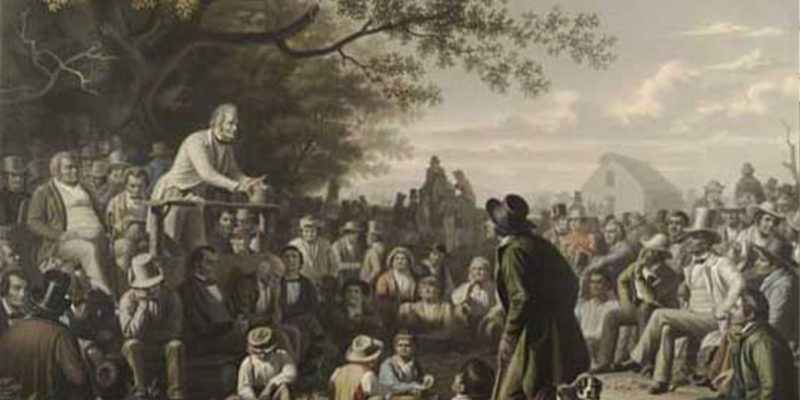Locke’s philosophy is not only wrongly founded in the Old Testament, continually relying on the creation story of Genesis in order to justify capitalist theory, but it also selectively uses the Bible in order to excuse wealth disparity and social inequality.
John Locke is counted among the fathers of modern capitalism, as he both lays the foundations for the modern economic system we know today and espouses the strong Protestant work ethic that has come to undergird the American capitalist economy. Because of Locke’s Protestant background, much of his theory of property rights is founded upon the Bible. He draws heavily on the Bible to preserve “the understanding that society derived its religious and moral cohesion from a definitive body of traditionary knowledge” (Brown 1999, 362). Despite this, Locke narrowly focuses on the Old Testament and the concept of divine creation in Genesis, while avoiding mention of the teachings of Jesus Christ found in the New Testament. Locke’s God is serious and vengeful, providing mankind with certain gifts in order to improve the earth and punishing those who do not make the most of it. His theory of property, by which he who works is allowed to keep what he can, results in massive inequality across the board. But do the Book of Genesis and the teachings of Jesus support the permissibility of wealth disparity? Is Locke being true to the philosophy laid out in the Bible? Locke’s philosophy is wrongly founded in the Old Testament, continually relying on the creation story of Genesis in order to justify capitalist theory, while also selectively using the Bible in order to excuse wealth disparity and social inequality.
Common interpretations of John Locke’s theory of property rights in Second Treatise of Government laud him as the father of the modern capitalist system. His work appears in the foundations of the Declaration of Independence, and has since built the foundations for capitalist theory by influencing almost every aspect of modern society as globalization becomes a widespread phenomenon. Locke argues that through Creation, God gave the world to men in common, and because he bestowed men with the earth, they must use it in the most productive way possible – man must be able to appropriate the goods given to him by God through nature (Locke 2002, 12). In order to obtain property, man must take something that the state of nature has provided and use his labor in order to make it rightfully his. In doing this, man removes it from the state of nature and makes it useful, and physical labor becomes a marker for possession, as it cannot be supposed that God thought the earth should remain in common and uncultivated (Locke 2002, 15). In Locke’s interpretation, God created the foundations for the capitalist economy by commanding man to subdue and giving him the authority to appropriate what he sees fit (within reason). If this property were left unused, it would be a tremendous waste to society as well as an offense against God’s divine authority.
Locke begins his theory of property by building the foundations of the state of nature, which he later uses to justify the creation of a civil society as well as the rules governing both man and property. The purpose of the state of nature is to strip man to his original state, putting him in a state of perfect freedom where he has no worldly possessions or obligations (Locke 2002, 3). This is a state of liberty, but not a state of license where man can do whatever he wants; the state of nature is governed by a law of nature which all men are obliged to follow. This law of nature adapts the state of nature into civil society and teaches that because all men are equal and independent, “no one ought to harm another in his life, health, liberty, or possessions” (Locke 2002, 3). This law must be preserved by a divinely appointed authority, whose sole purpose is to execute laws in order to prevent men from being violent and unfairly biased. It is this state of nature and resulting law of nature that Locke uses in order to build the foundations of political society, drawing upon the Biblical chapters of Genesis and Exodus in order to justify his arguments for effective state-building. The state of nature and the state of civil society work in tandem to preserve property, with the state of nature establishing rights while the law of nature regulates them (Cherno 1957, 51). Locke creates these laws of civil society much like God hands Moses the Ten Commandments, and they follow the same basic tenets of preservation of conventional property ownership as well as preservation of life, providing a biblical basis to Locke’s theory of the laws governing civil society.
Although Locke takes divine inspiration for his rules governing civil society from God’s Ten Commandments, the two differ in that Locke’s laws of nature stipulate an importance of ultimate preservation of the self, or the self’s property, while God’s commandments are overarching rules that govern divine relationship as well as day-to-day business. Locke emphasizes the desire for individual preservation by stipulating that one “may not, unless it be to do justice on an offender, take away or impair life, or what tends to the preservation of the life, liberty, health, limb, or goods of another,” (Locke 2002, 3) which harkens back to the biblical commandments of “you shall not murder. You shall not commit adultery. You shall not steal… You shall not covet your neighbor’s house… wife… servant… anything” (Ex 20: 12-17). These commandments govern the relations between men, specifically the preservation of men’s property based on the threat of punishment by a higher power greater than man. Moses, in this situation, is the prophet and covenant mediator who uses these foundational commandments to build a “priestly kingdom and holy nation,” (Exodus 19:6) while Locke uses his own “commandments” to build a civil society in his own act of founding. However, unlike Moses, Locke ignores the commandments that govern interactions between man and the divine in order to narrowly focus on interactions between men. The first of the Ten Commandments states “You shall have no other gods before me, you shall not make for yourself an image in the form of anything in heaven” (Ex 20:3-4), a commandment Locke directly disobeys by elevating property to a godlike status, even justifying stealing as long as it improves land that would have previously gone to waste (Locke 2002, 17). Waste, in this society driven by greed, is an “offense against the common law of nature,” and is thus liable to punishment (Locke 2002, 17). Locke may take Biblical inspiration for his commandments governing civil society, but his version of the commandments narrowly focuses on rules that govern property rather than morality.
While Locke uses Genesis to justify his understanding of property, the word of God does not account for the type of use he imagines, and thus the words of Genesis are misappropriated and followed to the letter rather than to the spirit. According to the Creation story of Genesis, God created mankind “in our image . . . so that they may rule over the fish in the sea and the birds in the sky” (Gen 1:24) and told man and woman to “be fruitful and increase in number; fill the earth and subdue it,” (Gen 1:27) but God never formally established private property as a natural right. The stain of Adam and Eve’s original sin, through which God commands them to eat the food of the earth “through painful toil” rather than “reach[ing] out his hand and tak[ing] from the tree of life” to eat and live forever, paves the way for a constant and returning sense of jealousy regarding property. Locke cites their offspring Cain and Abel as prominent and industrious biblical founders who appropriately used the land God provided them, with Cain “leav[ing] yet enough for Abel’s sheep to feed on” (Locke 2002, 18) while building the foundations for industry to enlarge the stock of man and increase. Yet the biblical reality is that Cain murdered his brother Abel because he was ultimately jealous of Abel’s property. Abel brought God the more meaningful offering of the “fat portions from the firstborn of his flock,” (Gen 4:5) for which he had to toil for months to raise and fatten, while Cain offered up “fruits of the soil,” (Gen 4:3) which were far less labor-intensive and thus represented the lesser sacrifice. This, combined with human beings’ natural inclination towards sin, created wickedness as “human beings began to increase in number on the earth,” (Gen 6:1) prompting God to flood the earth in order to remove the corruption he had accidentally created. Thus, the disparity of wealth that results from Locke’s capitalist economy can be viewed as a result of the original sin of Adam and Eve. This, in turn, led Cain to become easily jealous of his brother Abel’s sacrifice, and disrupted the harmony of the earth, introducing discord for generations to come.
Locke places a heavy emphasis on biblical creation as the basis for the appropriation of property, and he largely ignores the teachings found in the New Testament, which are meant to be read in tandem with the Old Testament. Locke, therefore, fails to take the teachings of Jesus into consideration when setting up the rules for his consumerist society. Locke values property over regard for human life, directly disobeying Jesus’ greatest commandment, to “love your neighbor as yourself” (Mark 12:31) by asserting that the ordinary provisions of human life receive their value from human industry. John decries this greedy, need-based system of capitalism by commanding the followers of Christ to “not love the world or the things in the world,” because the love of God is not the love of property (1 John 2:15). He writes that “the desire of the eyes, the pride in riches, comes not from the Father but from the world,” (1 John 2:16). Ultimately, those who live out Jesus’ teachings and live a life of mercy, piety, and pureness of heart will gain the greatest fulfillment in the Kingdom of Heaven (Matthew 5:2-11).
Jesus himself takes a staunch anti-capitalist approach when entering the Temple of Jerusalem, where he enters to find people selling cattle and exchanging money for goods. He angrily drives these people out of the temple, commanding them to “stop making [his] Father’s house a marketplace,” (John 2:16) because his “house shall be called a house of prayer, but you are making it a den of robbers” (Matthew 21:13). Jesus clearly calls for a separation between holy worship and matters of money, or property, placing the highest value upon respect for God the Father and proving that God’s creation of property does indeed have its limits. By this logic, man should not focus on what he can accumulate on earth, because, according to Jesus, it will not matter once he reaches the Kingdom of Heaven, which, according to Christ, should be the ultimate end goal of the human soul. One should make entering the Kingdom of Heaven their priority rather than industriously appropriating as much property as possible, even if the purpose of God’s creation is to till the land.
Locke’s theory of property rights in the state of civil society has influenced almost every aspect of the American capitalist system that we know today. Locke’s theory is heavily influenced by the Bible, which can be attributed to his Protestant roots. Close analysis of both biblical text and Locke’s Second Treatise of Government reveals that his theory of property is selectively influenced mainly by the Old Testament. Locke argues that through Creation, God gave the world to men in common to use in the most productive way possible, resulting in mass inequality across the board. Although the book of Genesis does establish that man should go forth and till the earth, God never divinely establishes a formal right to property. Consequently, Locke’s theory of property is selectively biblically founded. The teachings of Jesus found in the New Testament emphasize a respect for the dignity of the human person and stipulate that the wealth that one acquires on earth does not matter, as all forms of disparity will be erased in the Kingdom of Heaven.
Works Cited
Brown, Robert E. 1999. “Edwards, Locke, and the Bible.” The Journal of Religion 79(3): 361-384.
Cherno, Melvin. 1957. “Locke on Property: A Reappraisal.” Ethics 68 (1): 51-55.
Coogan, Michael David., et al. 2010. The New Oxford Annotated Bible: with the Apocrypha. Oxford: Oxford University Press.
Locke, John. 2002. Second Treatise of Government. New York: Dover Publications.




 Compass is an online journal that provides a space for the work of talented undergraduates who have original and well-articulated insights on important ideas and issues relating to American democracy understood in the broad contexts of political philosophy, history, literature, economics, and culture.
Compass is an online journal that provides a space for the work of talented undergraduates who have original and well-articulated insights on important ideas and issues relating to American democracy understood in the broad contexts of political philosophy, history, literature, economics, and culture.